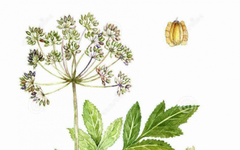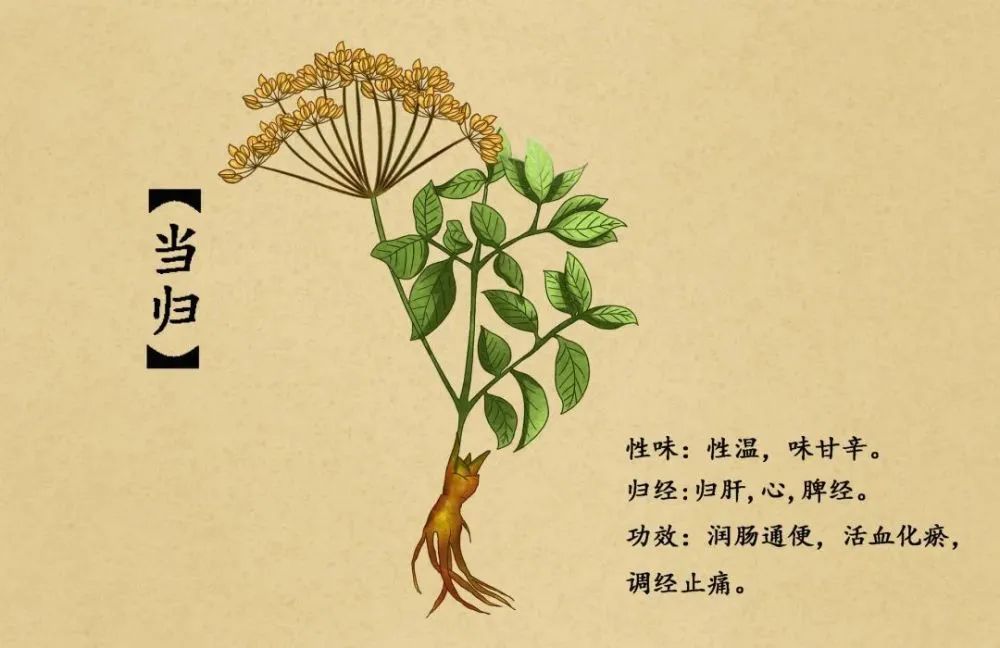

When
Gui
“The Legend of Dang Gui” According to legend, in an ancient village on the border of Yunnan, there was a young herbalist who had just married. Due to the pressures of life, he had to go into the mountains to gather herbs. His wife was reluctant to part with him, and during their tearful farewell, he advised her to endure the hardships at home and allowed her to remarry if he did not return within three years. Little did he know that after three years, due to the deep mountains and dense forests, he could not communicate. For three years, his wife received no news of him, and her worries led to a deficiency of qi and blood, resulting in a serious gynecological condition. Seeing her deteriorating health, her mother-in-law felt pity and advised her to remarry. Initially, she was reluctant, but later, believing her husband was likely dead after three years, she succumbed to the pressure and chose another partner. Unexpectedly, one day shortly after her remarriage, the young herbalist returned. Upon learning that his wife had remarried, he was filled with regret and sent a message asking to meet and recount their past. When they met, they both wept bitterly:“Three years, you did not return, Not a single word from you, Now I have married another, My heart aches with regret.” The young man, filled with remorse, learned of her difficult circumstances and gifted her some herbs to sell for a living. After he left, the heartbroken woman, recalling her unfortunate fate, felt despondent and randomly brewed some herbs to consume, hoping to end her life. To her surprise, after a few days, her complexion began to improve, becoming rosy, and her illness was miraculously cured. Later, people remembered the painful lesson of the young herbalist who did not return, causing his wife to remarry, and thus named this herb “Dang Gui” (Angelica sinensis).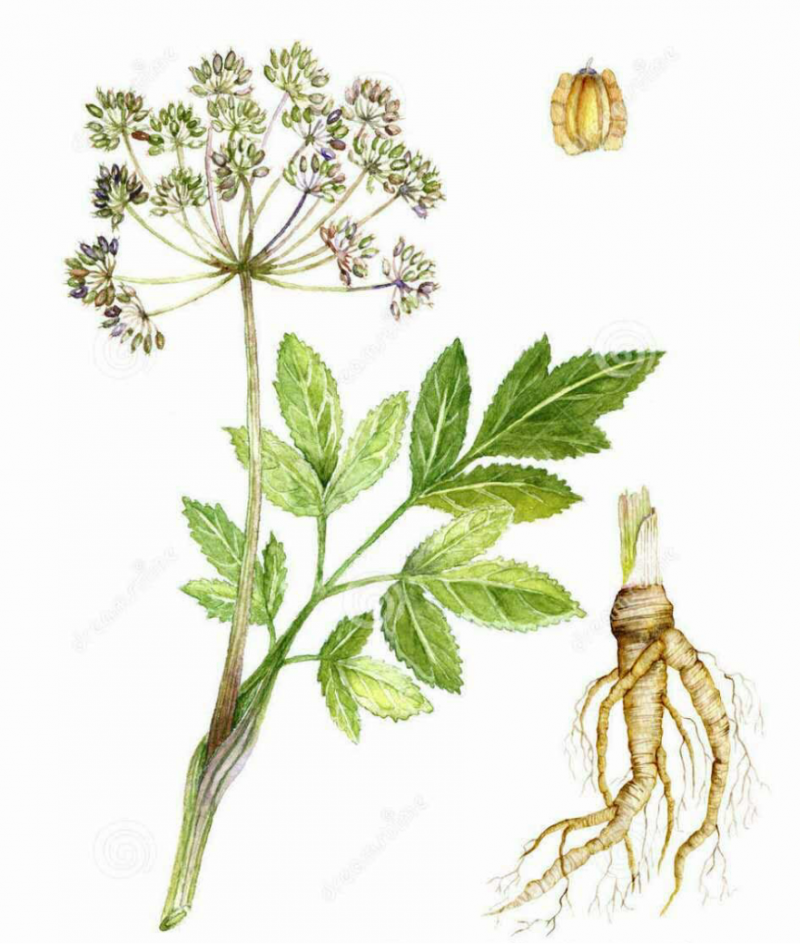
Three
Layers
of
Meaning
Today, people believe that Dang Gui has three layers of meaning:
1. The meaning of longing for a husband. Li Shizhen held this view, stating in the “Compendium of Materia Medica”: “In ancient times, marrying a wife was for the purpose of continuing the lineage. Dang Gui regulates blood and is an essential herb for women’s issues, embodying the meaning of longing for a husband, hence the name Dang Gui.” There is a folk saying: “At the end of May and the beginning of June, a beautiful woman buys paper to paste her windows, her husband has been away for three years, and not a single letter has been received.” The four types of herbs mentioned are Ban Xia (Pinellia ternata), Fang Feng (Saposhnikovia divaricata), Dang Gui (Angelica sinensis), and Bai Zhi (Angelica dahurica). In the story above, the husband has been away for three years, and the wife longs for his return, which conveys the meaning of “longing for the husband to return.” This saying has deeply resonated with the people.
2. The meaning of guiding blood back to the meridians. Huang Gongxiu recorded in “Seeking the Truth of Materia Medica” that Dang Gui: “Can unblock stagnant blood, nourish blood, moisten dryness, and calm chaotic blood, allowing blood and qi to adhere, and qi and blood to stabilize, preventing them from scattering and losing their way, hence the name Dang Gui, which reflects this meaning.” Dang Gui can help blood flow normally through its designated meridians, thus the name also makes sense.
3. Originating from a place name. The main production area of Dang Gui is in E County, Gansu. During the Tang Dynasty, the area near Min County was called “Dang Prefecture” because before the Tang Dynasty, it was inhabited by the “Shaodang Qiang” people. The local specialty is a fragrant herb called “Qi,” which is Dang Gui. In ancient times, “Qi” rhymed with “Gui,” hence the name Dang Gui.
So, which explanation is correct? It is now impossible to verify. However, from a historical perspective, people tend to favor the third explanation, where “Dang” is a place name, and “Gui” is the name of the herb.
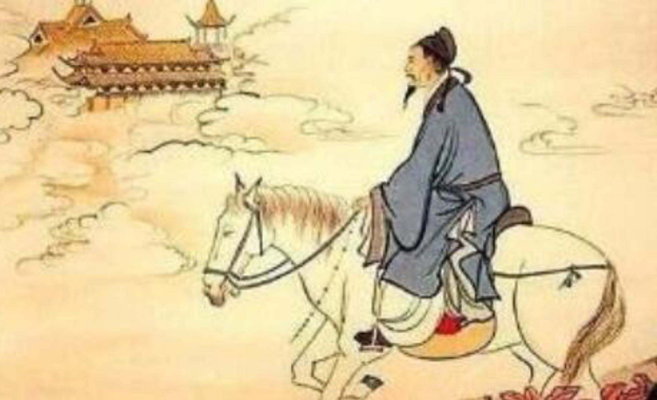
Dang Gui

Dang Gui (学名:Angelica sinensis), also known as Gan Gui, Qin Na, Xi Dang Gui, Min Dang Gui, Jin Dang Gui, Dang Gui Shen, Han Gui Wei, Wen Wu, Dang Gui Qu, and Tu Dang Gui, is a perennial herb that grows to a height of 0.4-1 meter. The flowering period is from June to July, and the fruiting period is from July to September.
[Properties and Meridians] It is warm in nature, with a sweet and spicy flavor. It enters the Liver (Gan), Heart (Xin), and Spleen (Pi) meridians.
[Functions and Indications] Nourishes blood, invigorates blood circulation, regulates menstruation, alleviates pain, and moistens the intestines to relieve constipation. It belongs to the category of tonifying herbs, specifically blood tonics.
[Clinical Applications] The dosage is 6-12 grams, decocted for oral administration. It is used to treat blood deficiency with symptoms such as pale complexion, dizziness, palpitations, irregular menstruation, dysmenorrhea, abdominal pain due to deficiency and cold, dry intestines with constipation, rheumatic pain, trauma, and abscesses.
[Contraindications] It is contraindicated for patients with excessive heat and bleeding, and should be used with caution in cases of dampness and fullness, as well as diarrhea.
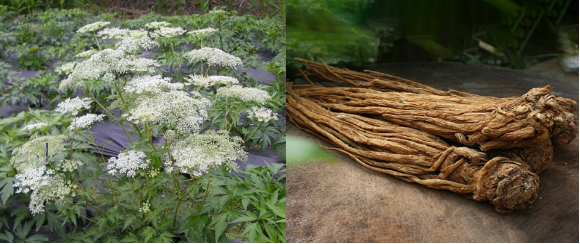
In ancient poetry, the term “Dang Gui” frequently appears, such as in the Song Dynasty poem by Wang Zhi: “What herb can cure the intestines nine times, the durian is not like Shu Dang Gui. Yet the cap and hat of the expedition are removed, tears fall like the sound of monkeys in the Ba Gorge. Eyes are desolate, dreams only fly beside old friends.——”Huanxi Sha”; and in another poem by Liu Chenweng: “Scratching the troublesome hemp fairy claws, enduring the guest’s clothes. The long night, the moonlight on the window forms a curtain. It does not explain the wind and rain of tomorrow, nor Dang Gui.——”Nan Ge Zi: Scratching the troublesome hemp fairy claws”; and in the Wei-Jin poet Tao Yuanming’s “A lifetime in a different era, this saying is truly not false. Life is like a transformation, ultimately Dang Gui is empty and without.——”Returning to the Garden and Fields”. These references to “Dang Gui” in ancient poetry often carry a sense of nostalgia and longing for home.
Dang Gui, Dang Gui, why not return…
Please be sure to use medication under the guidance of a professional physician. Do not self-medicate.
WeChat has been revamped
Now, encountering our popular science posts is all about fate
Without marking the subscription account, the push will be delayed
And you can only see the title and small image
Everyone remember to mark “Health Henan” with a three-star!

What Everyone is Watching:
The Central Meteorological Observatory has issued six warnings! The highest level! Henan has initiated a major meteorological disaster (strong wind) IV-level emergency response
After eating and drinking excessively, the “Health Three Reductions” comes to help you!
Quickly check if you have these 5 small grains at home, and get rid of them immediately!
Heartbreaking! A 19-year-old star passed away due to illness! Just diagnosed with a rare disease 10 days ago
Never flush the toilet while on the way to the restroom, absolutely not, because…
[end]
Review Expert|Chief Pharmacist Niu Debin, Xixian People’s Hospital
Editor|Gu Mengyang
Proofreader|Liu Rongjie
(Some images in the text are sourced from the internet, for non-commercial use only, used for public welfare popular science. If there is any infringement, please contact for deletion.)

